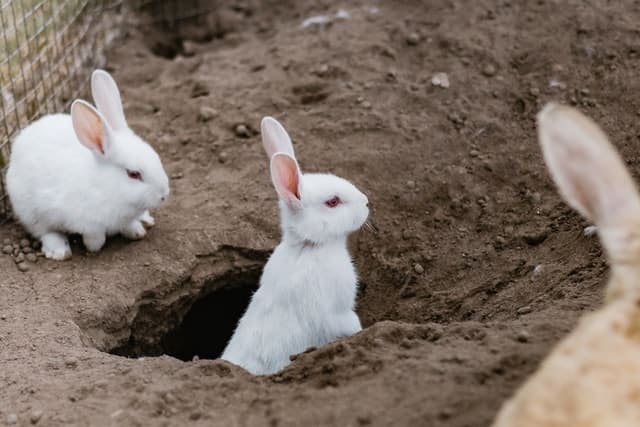
Although it may seem that rabbits are silent animals or to call them “mute” in some way, they are not. In this post we will write about the different sounds that rabbits make and their meaning.
Rabbit sounds and their meaning
As we spend time with a rabbit we will see that rabbits can make more sounds than we expect. Many of the sounds they make are related to their well-being and good relationship with their rabbit daddies. Some of the sounds that rabbits make are:
- Clucking: it is a clucking sound but at a very low frequency, almost imperceptible. This sound is produced while chewing something that they like a lot, it does not have to be food, it can simply be a piece of wood or cardboard that they use to play.
- Grunting: Rabbits can grunt. It is a sound of defences, when they feel threatened or do not want to be touched. They usually do it before taking a bite.
- Purr: Rabbits, like cats, purr. However, this purr is produced by gently brushing your teeth. As in cats, it means that the rabbit is calm and happy.
- Whistle: Rabbits that live with other rabbits whistle to expel their congeners.
- Hit with the hind legs: it is true that when a rabbit gives a strong blow with its hind legs it means that something has not liked but they also use the sound produced by the blow to warn other rabbits that something bad is to come, such as for example that it has detected the presence of a predator.
- Grinding teeth: when a rabbit grinds loudly, we are facing one of the signs of pain in rabbits. IT usually communicates that it is suffering, so it would be urgent to take them to a vet.
- Screams: This sound is produced when they are being chased by a predator or when they are dying.
- Whining: Rabbits whine or whine when they don’t want us to handle them. They can also do it when they are with another unwanted bunny or when a female communicates to a male that she does not want to copulate.
- Buzzing: this sound is typical of males when trying to woo a female.
- Horn: Accompanied by circular turns, horn sounds are often linked to courtship behaviour.
- Hiccups: They make small, repeated squeaks while bobbing up and down for a short period of time. Small episodes of hiccups are not a cause for concern, if your rabbit has these hiccups very frequently or last longer than 5-10 minutes, it should be checked by your exotic veterinarian.
- Snoring: Oddly enough, yes, rabbits can snore, but quiet is not as irritating a sound as it is that of humans. If your snoring rabbit also has a runny nose, sneezes a lot or has watery eyes, you should see your vet.
- Sneezing: Like most other animals, rabbits also sneeze. Rabbit sneezes sound like pretty squeaks as they shake their heads a bit. If your rabbit sneezes a lot, or if the sneezes are accompanied by a runny nose, watery eyes, or wheezing, then you’ll want to take them to the vet.
Rabbit sounds are almost all very quiet. You must listen carefully to hear what your rabbit is saying and take the time to learn to distinguish between all of them.
We all want to know that our rabbit is happy and content. Sometimes they make some noises to let us know exactly how excited they are.
Bunnies also make sounds to let you know that they are angry or upset with you or something in their environment. These louder and more aggressive sounds can also mean that your rabbit is afraid of something. They may try to warn you of danger or try to be brave even if they are afraid. Finally, there are other sounds that can alert you if your rabbit has any type of health problem that needs medical attention.
In addition to sounds, rabbits will also communicate with us through gestures. Many of them may not even expect you, for example, When your bunny leans on its hind legs with its ears back , it means that it is angry (many people think that bunnies look adorable like that, but it is not a good sign ).






